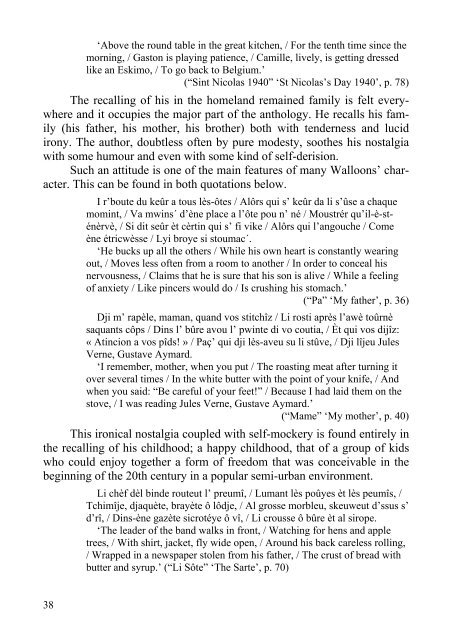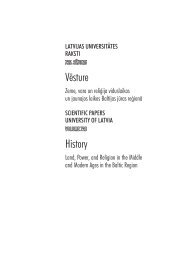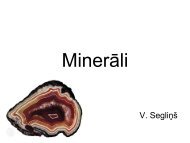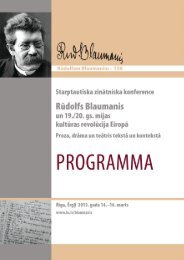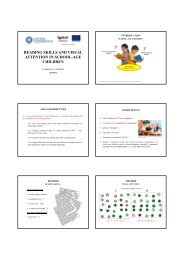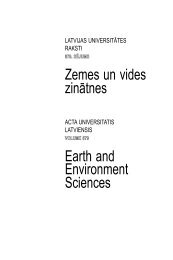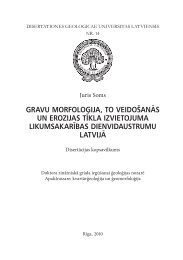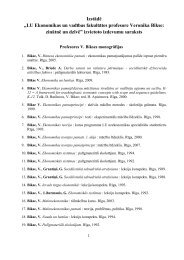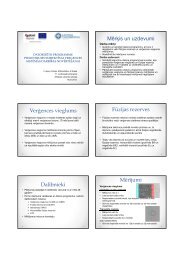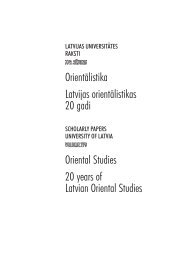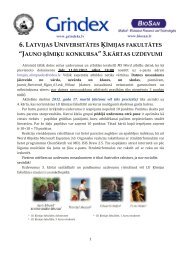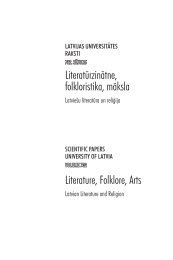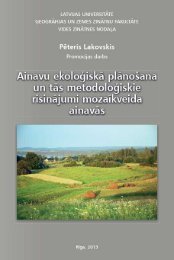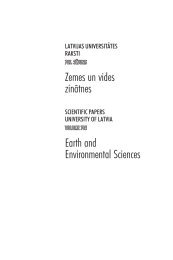Latgalistikys kongresu materiali, III. 2011. - Latvijas Universitāte
Latgalistikys kongresu materiali, III. 2011. - Latvijas Universitāte
Latgalistikys kongresu materiali, III. 2011. - Latvijas Universitāte
You also want an ePaper? Increase the reach of your titles
YUMPU automatically turns print PDFs into web optimized ePapers that Google loves.
‘Above the round table in the great kitchen, / For the tenth time since the<br />
morning, / Gaston is playing patience, / Camille, lively, is getting dressed<br />
like an Eskimo, / To go back to Belgium.’<br />
(“Sint Nicolas 1940” ‘St Nicolas’s Day 1940’, p. 78)<br />
The recalling of his in the homeland remained family is felt everywhere<br />
and it occupies the major part of the anthology. He recalls his family<br />
(his father, his mother, his brother) both with tenderness and lucid<br />
irony. The author, doubtless often by pure modesty, soothes his nostalgia<br />
with some humour and even with some kind of self-derision.<br />
Such an attitude is one of the main features of many Walloons’ character.<br />
This can be found in both quotations below.<br />
I r’boute du keûr a tous lès-ôtes / Alôrs qui s’ keûr da li s’ûse a chaque<br />
momint, / Va mwins´ d’ène place a l’ôte pou n’ né / Moustrér qu’il-è-sténèrvè,<br />
/ Si dit seûr èt cèrtin qui s’ fi vike / Alôrs qui l’angouche / Come<br />
ène étricwèsse / Lyi broye si stoumac´.<br />
‘He bucks up all the others / While his own heart is constantly wearing<br />
out, / Moves less often from a room to another / In order to conceal his<br />
nervousness, / Claims that he is sure that his son is alive / While a feeling<br />
of anxiety / Like pincers would do / Is crushing his stomach.’<br />
(“Pa” ‘My father’, p. 36)<br />
Dji m’ rapèle, maman, quand vos stitchîz / Li rosti après l’awè toûrnè<br />
saquants côps / Dins l’ bûre avou l’ pwinte di vo coutia, / Èt qui vos dijîz:<br />
« Atincion a vos pîds! » / Paç’ qui dji lès-aveu su li stûve, / Dji lîjeu Jules<br />
Verne, Gustave Aymard.<br />
‘I remember, mother, when you put / The roasting meat after turning it<br />
over several times / In the white butter with the point of your knife, / And<br />
when you said: “Be careful of your feet!” / Because I had laid them on the<br />
stove, / I was reading Jules Verne, Gustave Aymard.’<br />
(“Mame” ‘My mother’, p. 40)<br />
This ironical nostalgia coupled with self-mockery is found entirely in<br />
the recalling of his childhood; a happy childhood, that of a group of kids<br />
who could enjoy together a form of freedom that was conceivable in the<br />
beginning of the 20th century in a popular semi-urban environment.<br />
Li chèf dèl binde routeut l’ preumî, / Lumant lès poûyes èt lès peumîs, /<br />
Tchimîje, djaquète, brayète ô lôdje, / Al grosse morbleu, skeuweut d’ssus s’<br />
d’rî, / Dins-ène gazète sicrotéye ô vî, / Li crousse ô bûre èt al sirope.<br />
‘The leader of the band walks in front, / Watching for hens and apple<br />
trees, / With shirt, jacket, fly wide open, / Around his back careless rolling,<br />
/ Wrapped in a newspaper stolen from his father, / The crust of bread with<br />
butter and syrup.’ (“Li Sôte” ‘The Sarte’, p. 70)<br />
38


